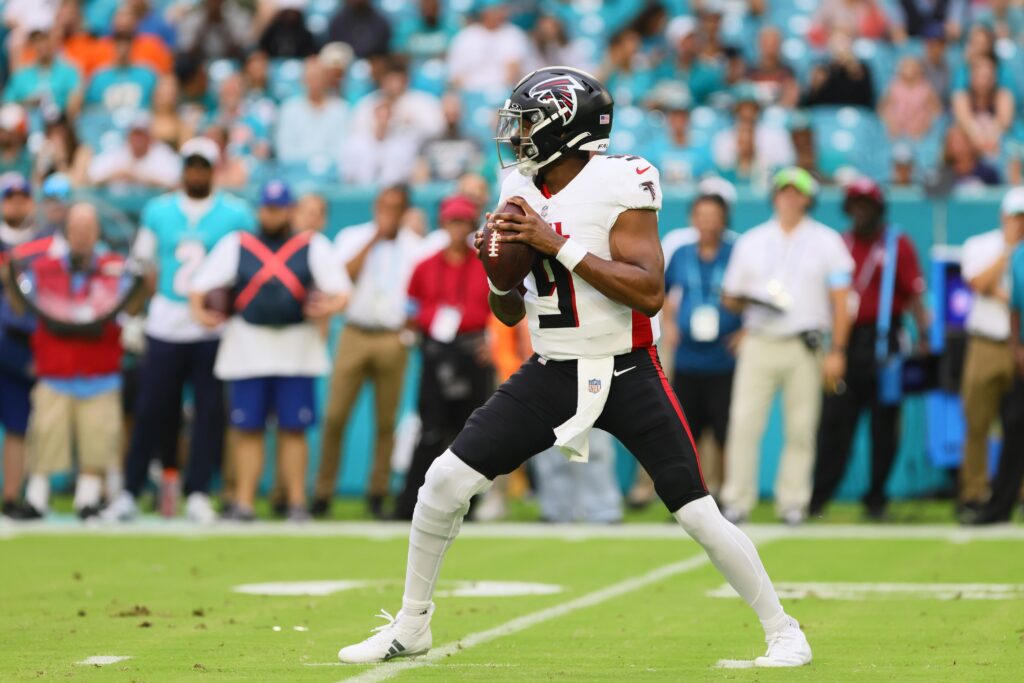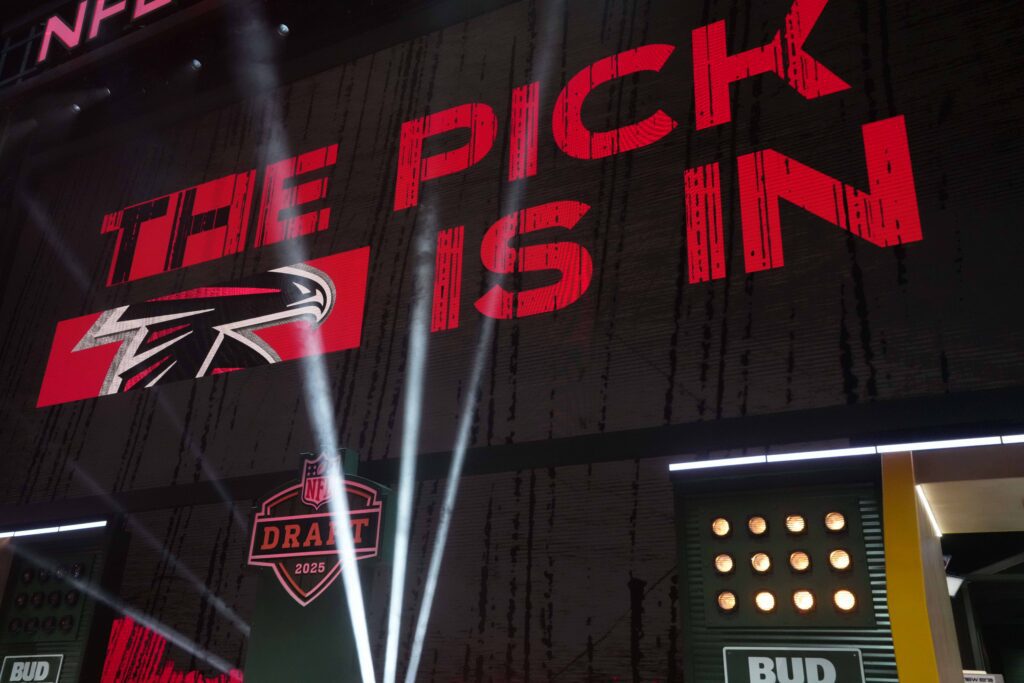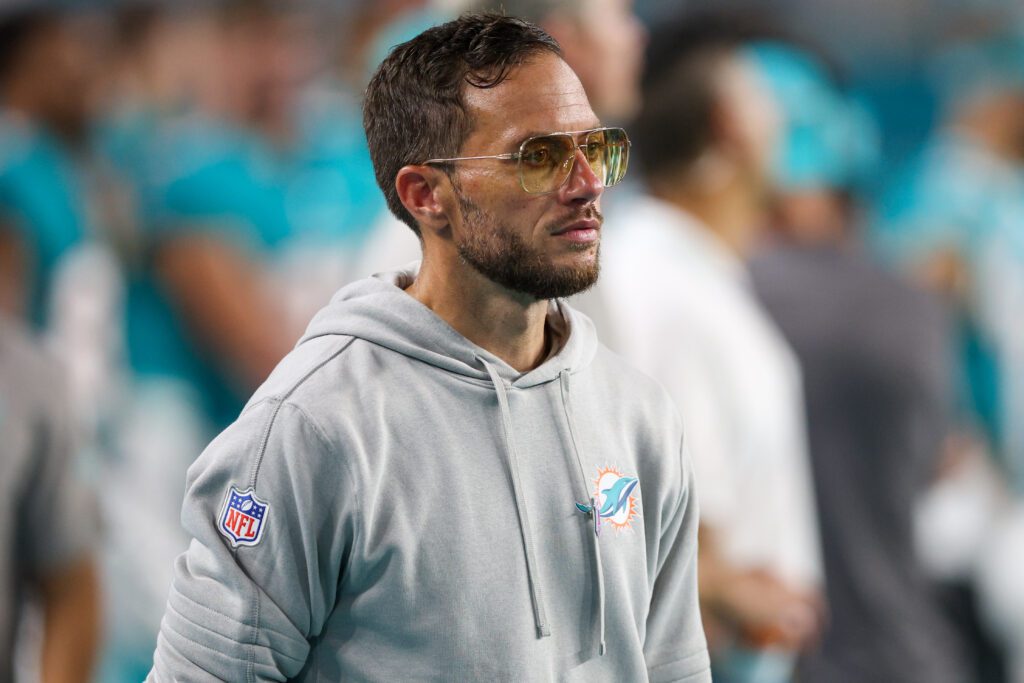It’s been over 100 days since the Atlanta Falcons selected University of Washington quarterback Michael Penix, Jr. with their first-round pick (the eighth pick overall) in the NFL Draft. Minicamps and voluntary workouts have passed. Training camp has begun and has transitioned into preseason football. Opening day for the Falcons is less than a month away.
Many were stunned by the pick at the time. Many didn’t like it. The Falcons had signed former Minnesota Vikings quarterback Kirk Cousins to a four-year, $180 million contract in free agency. $100 million was guaranteed. The prevailing wisdom was that Atlanta would draft a defensive player. Nobody – *NOBODY* – was talking about Penix (or any other quarterback, for that matter) to the Falcons in the first round. Ian Rappaport of the NFL Network was the first to report on the air 30-60 minutes before the draft began that there were rumblings about Atlanta and Penix at eight. Penix addressed no immediate need. He represented a long-term answer for the future.
It’s time to be okay with the pick.
Why? Let’s count the ways…
1) Cousins’ contract is not the big deal people make it out to be
Cousins’ contract and the salary cap implications that go with it are largely overstated. It’s not really a four-year deal. It could be as short as a two-year deal. Per OverTheCap.com, the Falcons could release Cousins after the 2025 season and free up $32.5 million worth of cap space while absorbing a $25 million dead money hit. If they released him after the 2025 season in a post-June 1 move, they’d free up $45 million while only taking a $12.5 million dead money hit. Given that Cousins’ cap number jumps to $57.5 million if he’s still on the roster in 2026 (compared to $25 million in ’24 and $40 million in ’25), cutting him after the 2025 season makes financial sense.
(note: Cousins has a no-trade clause in his contract, so releasing him is really the only option to get out of his contract)
2) Penix has time to develop
Moving on from Cousins after two years while Penix sits on the bench should benefit Penix because, as talented as he is, he is regarded in some circles as not currently being NFL-ready. His footwork needs to be cleaned up (among other things, he tends to throw off his back foot way too much, instead of stepping into his throws), his throwing mechanics need to be refined, and he had upper-echelon talent (by college standards) at wide receiver and offensive line bailing him out at times, leading him to develop some bad habits.
Here are some excerpts from The Athletic’s draft expert, Dane Brugler: “Stiff lower body and doesn’t have picture perfect mechanics (inconsistent weight transfer, release points, etc.), which can disrupt his rhythm and accuracy … misses too many layups (often high) when he feels rushed … doesn’t throw with consistent anticipation (especially over the middle of the field), and his eyes tend to linger as he waits for an opportunity … excellent on drive throws but inconsistent on passes that require finesse and feathering between levels of the defense… Not only did he throw to NFL-caliber receivers at Washington, but he also benefited from an above-average offensive line, and his effectiveness plummeted when he felt the walls closing in (see the 2023 Michigan tape).”
To be clear, Penix’s positives far outweigh his negatives (otherwise he wouldn’t be regarded as a first-round-caliber player). You point out his negatives to emphasize that he needs two or more years on the bench to overcome those negatives, and therefore having him sit behind Cousins makes sense.
3) Atlanta thoroughly researched Penix
The Falcons did their homework on Penix and felt confident that he was worth the pick. They visited with him at the Scouting Combine in Indianapolis, held from February 29 through March 3. They met with him again at the University of Washington’s Pro Day in late March. Finally, they flew from Atlanta to Seattle to meet just with him for 45 minutes on April 5. When it was all said and done, Penix was the number-two quarterback on their draft board, per Yahoo! Sports, ahead of the likes of Jayden Daniels (taken with the second pick by the Washington Commanders) and Drake Maye (picked third overall by the Patriots).
Based on their research, Atlanta also felt that they needed to take Penix at eight or they would miss out on him completely. He would not be there in the second round when they picked 43rd overall. Mock drafts being done in the final hours before the Draft by media members who were running with info provided to them by sources they had within the league, such as The Draft Network (originally founded by ESPN’s Matt Miller) had the Las Vegas Raiders taking Penix with pick 13. James Palmer of NFL Media reported that the Seattle Seahawks, New Orleans Saints, and the Raiders all tried to trade up into the top ten picks of the draft in an attempt to get Penix (Seattle would later deny that report). The Los Angeles Rams were also trying to get into the top 10, though apparently for University of Georgia tight end Brock Bowers, not for a quarterback (the Falcons were one of the teams the Rams had contacted, per Dianna Russini of The Athletic).
4) The Falcons won’t be in a position to draft a franchise QB in the near future
The Falcons believe – logically – that with Cousins at quarterback, they are a playoff team. As such, they won’t have a first-round pick in the top ten again any time soon. In today’s NFL, if there’s a franchise-caliber quarterback available in the draft, he’s getting picked before playoff teams will have a chance at him. The highest a playoff team will select in the first round, barring a trade, is nineteenth overall. In this past draft, six quarterbacks were selected in the first 12 picks, with four of them going in the top 10. The first three picks were quarterbacks, and many mock drafts had the first FOUR picks being quarterbacks.
Atlanta also believed the quarterbacks that would likely be available in the next two drafts didn’t compare to this year’s crop.
If they were going to get a quarterback-of-the-future, it was going to have to be now, and that meant Penix. After three years of stumbling from a declining Matt Ryan to Marcus Mariota to Desmond Ridder to Taylor Heinicke, the decision-makers in Atlanta wanted a long-term plan in place, and that plan is based around Michael Penix, Jr.
5) Cousins had no problem with the pick
Concerns about Kirk Cousins’ attitude about the situation were overblown. Reports flew all over the place after the Penix pick that he and his camp were “stunned” and “confused” by the selection. The Falcons didn’t notify Cousins that Penix was going to be their choice until mere minutes before they made the choice.
Per Josh Kendall of The Athletic, however, Cousins’ recollection of being notified of the pick was, “They called me and said, ‘We’re going to take a quarterback here,’ and I’m like, ‘OK.’ It was pretty straightforward.” Cousins reached out to Penix via telephone shortly after Penix was picked and had a “very good conversation” with him, per Penix. When asked if he was upset about the pick in his first press conference after the Draft Cousins replied, “I don’t think it’s helpful… Let’s all be on the same page and try and go win a Super Bowl.”
As far as helping Penix, Cousins said, “… I have the utmost respect for what he’s done and we’re ready to get to work. And I’m here if he needs me.” Cousins has also said, “The quarterback room is a working force for one another… We’re all in there to help each other… You make deposits in people. You serve… I think it’s so important… to help each other succeed.”
Doesn’t sound like someone with a beef, either with the team or with his heir apparent, does it?
Even if Cousins didn’t like the pick, let’s remember that Brett Favre didn’t like the Aaron Rodgers pick in 2004. Favre continued to play well with Rodgers sitting for four years. Rodgers didn’t like the Jordan Love selection in 2020. Rodgers won the NFL Most Valuable Player award shortly thereafter.
As for not letting Cousins in on their plans, don’t be surprised if Atlanta did that intentionally. This is purely conjecture, but consider this: the Falcons were under investigation for tampering in regards to Cousins’ contract (as well as wide receiver Darnell Mooney‘s and tight end Charlie Woerner‘s, the NFL would wind up taking a 2025 fifth-round pick away from Atlanta as punishment). This means that the Falcons began negotiations with him before they were legally allowed to do so per NFL rules. How did the league find out about the alleged tampering? Cousins opened his mouth and said something he wasn’t supposed to after signing the contract.
In his first press conference as a Falcon Cousins said, “There’s great people here… And it’s not just the football team. I mean, I’m looking at the support staff. Meeting — calling, yesterday, our head athletic trainer, talking to our head of P.R., I’m thinking we’ve got good people here. And that’s exciting to be a part of.”
If he can have a slip of the tongue like that, who to say how he might’ve slipped up if he’d known about drafting Penix?
There shouldn’t be concerns about Cousins having a bad attitude about the situation, irrelevant of its potential effect on his level of play. He’s been around the league for a long time. He’s a professional. He knows how things work. He’s guaranteed $100 million regardless of how things work out. He’s also widely considered one of the nicest guys in the league. Cousins and Penix have coexisted without issue ever since the pick and are, in fact, now roommates (along with quarterback Taylor Heinicke and tight end Kyle Pitts) at training camp.
6)Concerns over Penix’s age are exaggerated
Many are concerned about Penix being “overaged.” He turned 24 on May 8. Assuming he sits for two years, he’ll be 26 when he finally starts an NFL game. Bo Nix, drafted 12th by the Denver Broncos, turned 24 back on February 25th. Jayden Daniels, selected *SECOND* overall by the Washington Commanders, will turn 24 on December 18th. Nobody’s talking about their age the way people are talking about Penix’s, though, to be fair, Daniels and Nix are expected to start right away.
Nevertheless, Penix beginning his career as a starting quarterback at 26 shouldn’t really bother people. On the one hand, yes, two of at least four (and possibly five) years of him on a rookie contract is being wasted. On the other hand, though, if he’s Atlanta’s starter for at least a decade he’ll be just 36 at the end of that span. In this day and age, it’s not unexpected to see a quarterback play to that age, or even older. Tom Brady retired at the age of 45. Peyton Manning retired at the age of 40, and he played his final season with a surgically repaired neck. Drew Brees retired at 42. Aaron Rodgers is still playing at 40 years old. Kirk Cousins, who just signed that four-year deal, is 35.
The Falcons’ chances of getting at least a decade out of Penix as a starter are pretty high.
Main Image: Sam Navarro-USA TODAY Sports



